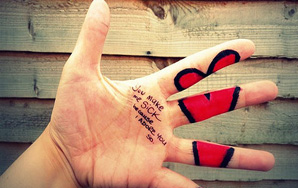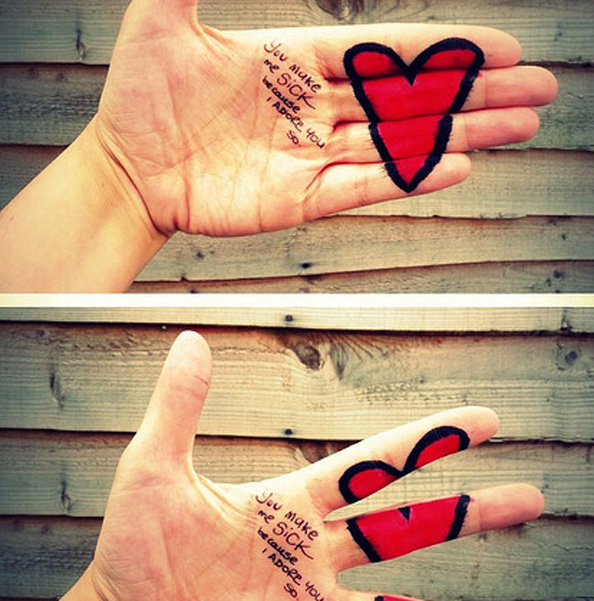
How To Tell When Someone Is Bad For You
I think that people start caring about us when we stop caring about them, as sick as it is. We move up and down in these odd games of power, and learn quickly that while some people are dependent on our approval, others are completely unconcerned with our opinion of them.

I knew someone in high school who was never really nice to me. Even in the moments he was my friend, you could always feel an undercurrent of disdain and mockery. But when you’re 16 and not particularly attractive or well-liked, you take friends where you can get them. I think we could all pick out a few people from our adolescence whose friendships were conditional at best, outright imagined at worst. Though the more acute pains of having a false friend have largely subsided, there are specific instances I can pick out and think about to get that stomach-punch feeling of righteous indignation. There was the time I wasn’t invited to a group outing, the time I was called a nasty name having to do with my cystic acne and rosacea. All in all, though, the slights have faded into as much of a nebulous hum as the rest of my time in high school.
For most of the time between graduation and now, I largely ignored him. At first it was an active decision, then it became mostly unconscious. There was no longer that burning need to dispel something from my life; I just found that I was happy when I was making more of an effort to give my time to the people who were actually interested in caring for it. Recently, we’ve started speaking again. I think it’s easier to reunite on common grounds when you’re older, when you’re not constrained by the social castes of high school or college, and when you have your own individual lives constructed. Maybe he wouldn’t have reached out to me if I didn’t have a job or an apartment or a life in a city generally regarded as “cool.” Maybe I passed some kind of social litmus test. But I think it’s more complex than that.
I think that people start caring about us when we stop caring about them, as sick as it is. We move up and down in these odd games of power, and learn quickly that while some people are dependent on our approval, others are completely unconcerned with our opinion of them. And when you can sense that someone is subservient to your emotional power — when they are as desirous of your attention and affection as you are indifferent towards theirs — it’s easy to be disdainful of them. It’s easy to lose respect, because you can see that they have a fundamental disrespect for themselves in the way they are around you. When someone degrades themselves by coming back to an emotional well that is clearly dry, it’s all the easier to dismiss them entirely. And when you feel like that spell, that need for approval, has evaporated in some way, this person can be almost immediately redeemed in your eyes. It’s all a game of power and interest, and we don’t even realize we’re playing it.
And that is when you know someone is bad for you. It’s not really the way they treat you — there are near-endless people throughout our day who are shitty to us for any number of reasons — it is in how they make you treat yourself. I know people who are colossal assholes who I don’t consider bad for me because their presence in my life renders me completely indifferent. They hold no weight, and certainly don’t make me degrade myself in any way for their attention. If they one day decided that they seriously disliked me and no longer wanted to associate with me, I would probably feel slightly relieved, if anything. But there are other people who are much less overtly negative, who might never call me a name or betray my trust, who I consider deeply bad for me. We all have people we reach out to constantly who never reciprocate. We call them, we offer to make plans, we give them things simply because we want to see them smile, and they will never care for us in return. And those are the people who, even if they are perfectly polite to us when we reach out to them, are profoundly bad for us.
After many years of distance, I talk to this guy again because I no longer consider him a negative influence on my life. There’s no reason to burn a bridge which I’ll never really cross again. His behavior has taught me that, at least for a long stretch of time, I’ll have to be guarded and superficial in my interactions. Maybe it will change one day, but for now things are just going to transpire on a shallow level. And, more importantly, his approval is no longer of particular interest to me.
There is something very strange in seeing a person who once considered themselves superior to you reaching out at a different point in life. You would think it would feel vindicating, but it doesn’t. It is supposed to imply that you changed (improved) somehow, but it doesn’t. All it says is that their standards for empathy are extremely conditional, and you could lose it again some day just by being yourself. And for people like this, the term “friendly acquaintance” was created and given meaning. Because as long as we understand that they have no real bearing on our lives, they will never be bad for us again. ![]()











